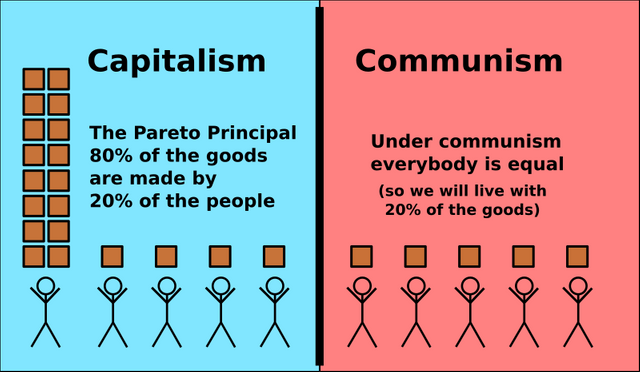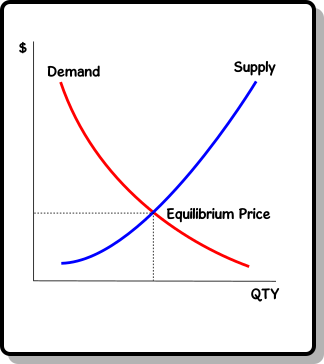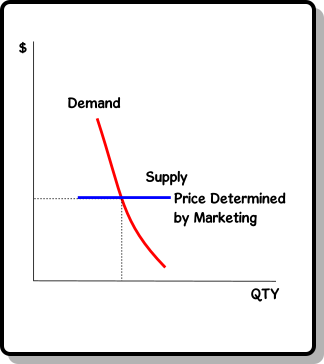In the First-world Nations, Do We Have a Free Market? As Compared To Communism???

There are lots of people who believe in Capitalism, and there are a lot of people who believe in Communism.
Neither have really existed in the last century. So, it is almost impossible to actually compare the two. However, we need better ideas for how to do things in the future. How to set up interactions between man for the betterment of mankind.
And to do that, we really need to understand the markets we live with:

Free market?
A free market is one where a buyer and a seller will negotiate on price to come to an outcome that both parties feel they are getting a good enough deal. A farmer trades his produce for money. The hungry person trades his money for produce. This is the ideal.
However, this only works when everything is about normal. Not near the edges. And not in a system where a few corporations owns the entire market.
A farmer has a bumper crop (and so do all the other farmers) more than we could all eat. So, the price gets lowered and lowered trying to sell his crop before it all rots. What ends up happening is that the farmer doesn't get enough money to plant next year.
The farmers have a horrible year. There is not enough food to feed everyone. The farmer can charge whatever he wants, and if hungry people have the money, they will buy it. Basically, the remaining food can be traded for ALL of the money. You can't eat money.
These two edge conditions destroy the market.
And the only way to live as humanity is to always grow excess food. And then feed the rest to chickens, or the compost pile.
We have to do this, else people starve.

The monopoly market
Currently, in first world nations, we think we have lots of choice. We can buy a Samsung TV, or an LG TV. We can compare features vs cost, and buy what we think is a good deal for us.
Sounds great. Sounds free market-ish.
But the entire thing is a sham.
The difference between a $500 TV and a $1000 TV (of the same size) is almost nothing in manufacturing costs. I would say the difference is less then $10. Probably more like $1. All of it is marketing. All of it is designed to get the most money out of you. Whether you are a cheapskate, or a big spender. Whether you are poor or rich.
There is no reality in this system. If we had actual competition, or actual prices based on inputs, we would have one TV with all the features.
And this marketing based pricing is only doable because the production of TVs is a monopoly. They really are all the same group. And they all do their marketing and pricing the same.
From toasters to automobiles, nothing is actually priced based on costs of manufacture. It is all priced on what the marketing people believe people will pay for it. (and yes, raising the price on something has sold more units.)

Our actual market

The supply-demand curve taught in schools today

The supply-demand curve that actually exists in our first-world nations
In order for a free-market to exists we need many suppliers and many buyers. (that are not part of some union / cartel / conspiracy)
Today, we don't have anything like that. For many things we have one supplier. ONE!!! And as long as their price is fair, it is actually a very good thing. One company does one thing very efficiently and everyone is happy. You would be surprised that many of the sub-suppliers for manufactured goods are like this. (and, if you didn't recognize it, that is a single point of failure that can take down the whole system)
Economies of scale can often do this. You can be making 10,000 parts for less than it costs to make 100. There is nothing you can do in a free market system. There is no way to compete. Go big, or go home.
Today we also have a handful of "name brands" that are often the same company behind the whole show.
We do not have many suppliers and many buyers.
We do not have anything like a free market.
Nor do we really have anything like a communist market.
We have all the greed of "capitalism", and all the price control of "communism"

In today's market, we have the worst of all worlds.
Tell me, does adding a TV to a fridge make it costs thousands of dollars more? A $100 TV added, and the fridge costs $2500 instead of $500?
Tell me that cell phone costs $1000 without a cell plan, but is free with a plan? Then were is the cell plan that costs $1000 less if i bring my own phone?
Nothing is priced based on labor and material inputs. Thus, we cannot make decisions about our impact on the earth.
And so, we do not have a free-market economy on most things, and thus, we cannot really have capitalism. The only difference between this and communism is perceived freedom and shopping options.
